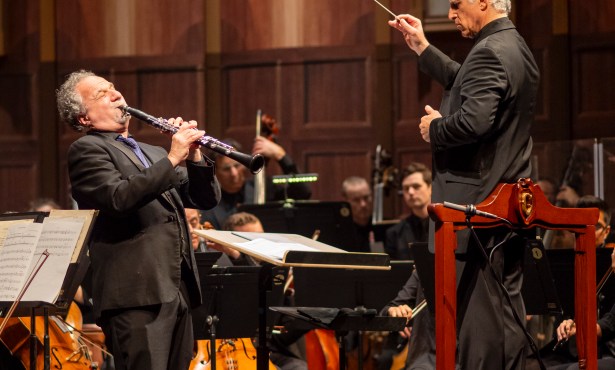Reflections on Werner Herzog’s Encounters at the End of the World
Frozen but Full of Life
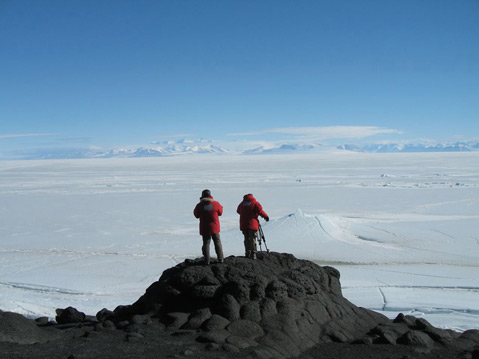
When the triumvirate of legendary adventurers Captain Robert Falcon Scott, Sir Ernest Shackleton, and Roald Amundsen initiated and, 20 years later in 1917, ended the so-called “Heroic Age of Antarctic Exploration,” the last corner of our globe was checked off the undiscovered list, and those hoping to grow up to be explorers were immediately out of luck. There was nowhere left to go on Planet Earth, the book was forever closed on searching for the unknown.
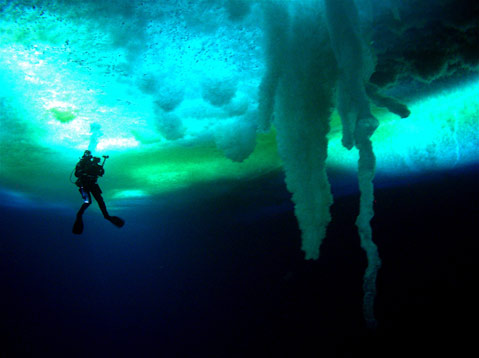
Well, at least that’s what famed director Werner Herzog believes. So in his latest flick, Encounters at the End of the World, which comes to Campbell Hall next week, the documentarian turns his camera on the folk who still toil in the extreme land of ice and oddity called Antarctica, and finds that there’s still plenty of discovery-both scientific and personal-happening down there. Plus, while it may be the “end of the world,” Antarctica is very much a key to the next world, whether that means living on the moon or figuring out how humans and other life-forms will persist on a planet that’s hell-bent on getting hotter.
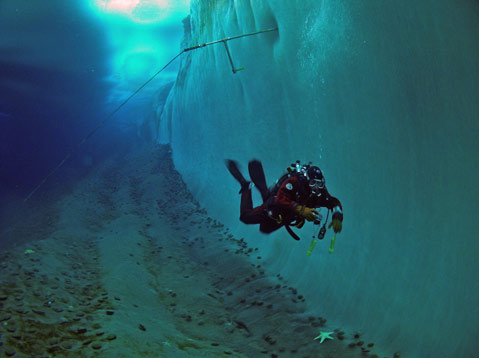
Working on the frozen continent for seven weeks thanks to a National Science Foundation grant, Herzog and his cinematographer, Peter Zeitlinger, began their trip as most Antarctic travelers do: at McMurdo Station, a desolate and aesthetically dire headquarters for the continent’s researchers where heavy machinery operates constantly, the sun shines all day and night during the “popular” season, and there’s plenty of reason to wonder why anyone would want to stay here long. The film, accompanied as usual by Herzog’s all-too-ponderous, German-accented narration, showcases the weird cycles of life at McMurdo, and features candid interviews with everyone from cafeteria workers, plumbers, and tractor drivers to retiring scientists, survival class teachers, and people who’ve come because it’s the last place on the map.
The portrayal brings back lots of memories for UCSB geology professor Bruce Luyendyk, who made eight research trips to Antarctica between 1989 and 2004. “McMurdo as a town is pretty bleak under the best of circumstances,” explained the marine geophysicist last week, noting the lack of trees and outdoor advertising typical in most towns. He said that there are two types of people at McMurdo: the “beakers,” or scientists, and the rest, who are contractors or military. “The contractors are a mix of mostly younger people looking for adventure and thinking this is the gateway,” explained Luyendyk. “What they find is a lot of hard work under challenging conditions and restrictions on their movements by the governing authority of the U.S. National Science Foundation.” He said that while scientists come for a few weeks or couple months, the contractors are locked into four- or six-month jobs. “A few extreme individuals are there to ‘winter over,'” he explained. “Those individuals who choose to return for multiple seasons have found a place in which only a few fit in.”
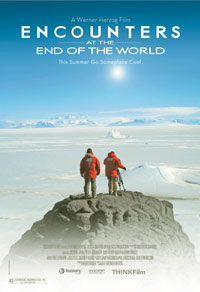
Life, as Herzog relays it and Luyendyk recalls it, is difficult at McMurdo, though attempts are certainly made at having fun. “Entertainment focuses on events at a few bars that close late at night. After drinking for a while until 12 or 1 a.m., it is a shock to step out into full daylight on the streets,” remembered Luyendyk. But worse was what to do after the fun time, when it’s time to go to bed, but the sun’s still shining. “Sleeping requires eyeshades and earplugs,” he explained, adding that you must “pretend it is dark and that it is not blowing hard and rattling the walls.”
Eventually, Herzog escapes McMurdo and gets out to the researchers’ field stations to learn about the sounds of seals, the derangement of penguins, the danger of exploding lava, and the beauty of icy fumaroles. It is on these journeys-all enhanced with probing, at times awkward interviews with both camera-shy and camera-loving researchers-that Herzog discovers McMurdo is just an entry point to this amazing world. And it’s well worth exploring this film for yourself.
4•1•1
Encounters at the End of the World screens at UCSB’s Campbell Hall on Wednesday, October 15, 7:30 p.m. Call 893-3535 or see artsandlectures.sa.ucsb.edu.

